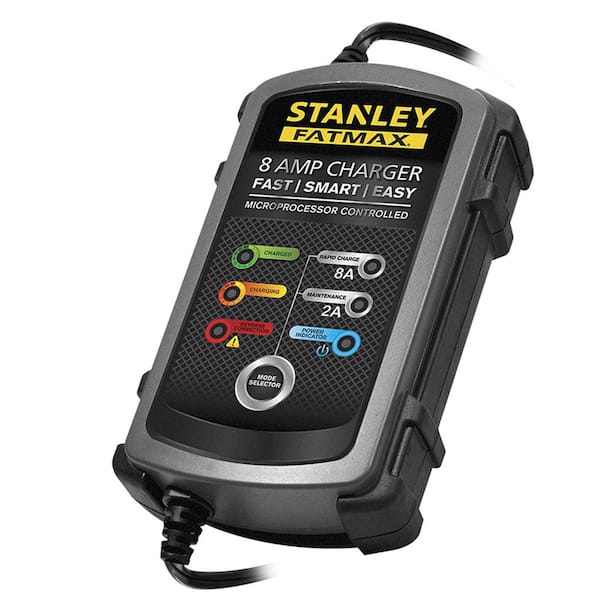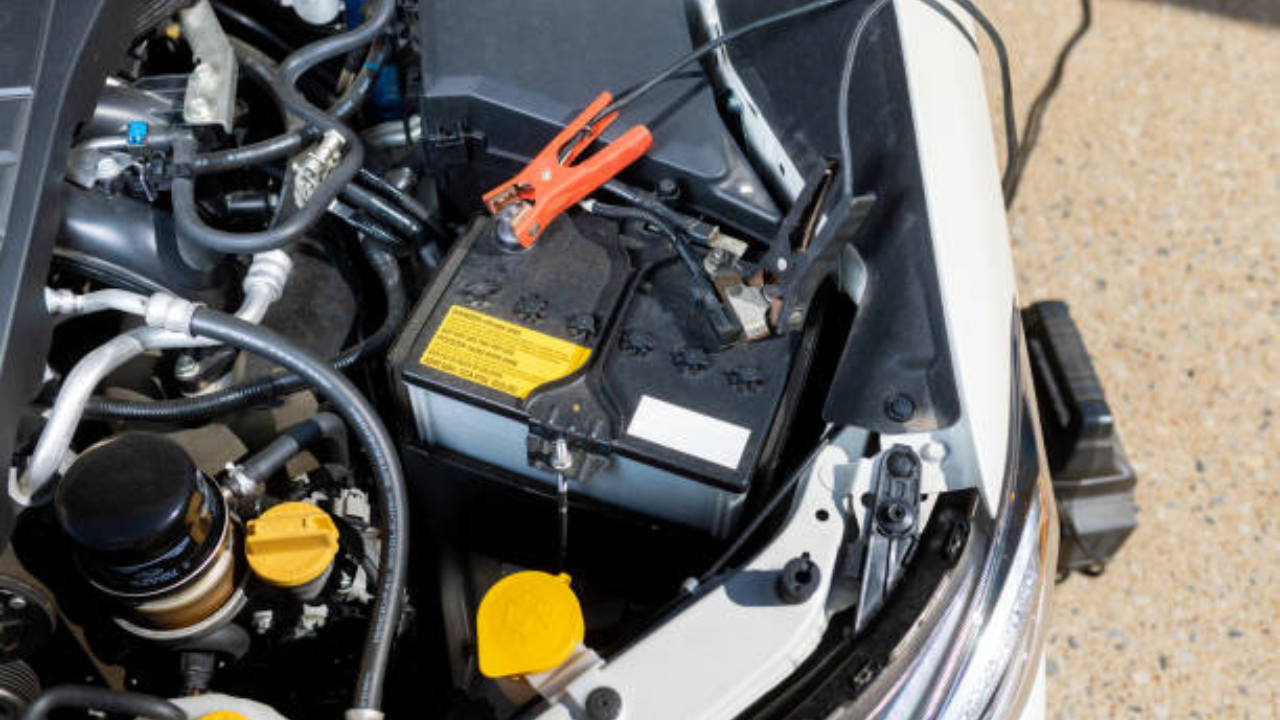Charging a car battery at 10 amps typically takes around 4-11 hours, depending on the battery’s capacity. Car batteries can be charged at 10 amps for varying lengths of time, depending on the type of battery and its capacity.
It’s important to ensure the battery is charged safely and effectively to avoid damage or reduced performance. We will explore the best practices for charging a car battery at a 10-amp rate and provide helpful tips for maintaining a healthy and efficient vehicle battery.
Understanding the charging process and factors that affect charging times can help car owners make informed decisions about battery maintenance. Whether you are a seasoned driver or a new car owner, knowing about car battery charging is essential for keeping your vehicle in top condition.
Understanding Car Battery Charging
To properly understand car battery charging, it is important to know how long it takes to charge a car battery at 10 amps. The charging time can vary depending on the battery’s condition, capacity, and charger efficiency, but generally, it takes around 6 to 8 hours for a full charge at 10 amps.
Understanding Car Battery Charging
Car battery charging is crucial to maintaining a vehicle’s electrical system. Many car owners often wonder about the optimal charging duration for their car batteries at 10 amps. To understand the process thoroughly, it’s essential to investigate how car battery charging works and the significance of correctly performing this task.
How Does Car Battery Charging Work?
Car battery charging involves the application of an electrical current to replenish the energy stored in the battery. When the vehicle is running, the alternator generates electricity, which is used to power the car’s electrical systems and simultaneously charge the battery. However, when the vehicle is not in use, a charger must be connected directly to the battery to maintain its charge.
Importance Of Charging A Car Battery Properly
Charging a car battery is essential to ensure its longevity and optimal performance. Improper charging can lead to sulfation, a process in which lead sulfate crystals accumulate on the battery’s plates, diminishing its charge capacity. This ultimately reduces the battery’s lifespan and performance, leading to eventual failure.
By charging the battery at the correct amperage and for the appropriate duration, car owners can significantly extend the life of their batteries and avoid potential breakdowns.
By understanding the inner workings of car battery charging and the importance of proper maintenance, car owners can ensure the longevity and reliability of their vehicle’s electrical systems. Proper charging helps prevent unexpected breakdowns and improves overall vehicle safety and performance.

Credit: www.harborfreight.com
Factors Affecting Charging Time
When charging a car battery at 10 amps, the charging time factors include its capacity, initial charge level, and age and condition. Additionally, the charging efficiency of the charger and ambient temperature also play a role in determining the time needed to charge the battery fully.
Factors Affecting Charging Time
When charging a car battery at 10 amps, several factors come into play, influencing the time it takes to achieve a full charge. Understanding these factors can help you make informed battery maintenance and charging decisions. Let’s delve into the crucial aspects that impact the charging time:
Capacity of the Battery
The battery’s capacity, usually measured in amp-hours (Ah), significantly determines the charging time. A higher battery capacity will require a more extended charging to reach a full charge. Alternatively, a lower-capacity battery will reach a full charge more quickly. It’s essential to consider the battery’s capacity when estimating the time required for charging at 10 amps.
Depth of Discharge
The depth of discharge, which refers to how much the battery has been drained, also affects the charging time. A battery that is deeply discharged will take longer to charge than one that has been partially discharged. The deeper the discharge, the longer the charging time required to replenish the battery’s energy levels fully.
Charging Current
The charging current, measured in amperes (amps), directly impacts the charging time. Higher charging currents will reduce the overall time required to charge the battery, while lower currents will extend the charging duration. When charging at 10 amps, it’s crucial to consider the battery’s capacity and depth of discharge to estimate the required charging time accurately.
Understanding these factors is essential for optimizing the charging process and maintaining your car battery’s longevity. By taking into account the battery’s capacity, depth of discharge, and charging current, you can effectively manage the charging time to ensure the optimal performance of your car battery.
Charging A Car Battery At 10 Amps
Charging a car battery at 10 amps can take 4-11 hours to reach a full charge. The exact time depends on the battery’s capacity and the level of depletion. Monitoring the charging process to ensure safety and avoid overcharging is essential.
Time Required For A Full Charge
Charging a car battery at 10 amps is a popular method for maintaining and recharging car batteries. When using this method, one of the most common questions is how long it takes to fully charge a car battery at 10 amps.
The charging time can vary depending on the size and condition of the battery, but as a general rule, you can expect it to take approximately 6-8 hours to charge a car battery at 10 amps fully.
Benefits Of Charging At 10 Amps
- Efficiency: Charging a car battery at 10 amps balances speed and efficiency. Experts often recommend it as it helps to prevent overcharging, extending the life of your battery.
- Compatibility: Most car battery chargers offer a 10 amp charging option, making it a convenient choice for many vehicle owners.
- Safe: Charging at a lower amperage, like 10 amps, reduces the risk of overheating and damage to the battery.
- Versatility: Charging at 10 amps allows you to use your battery charger for various battery sizes, making it a versatile option for car owners.
When charging a car battery at 10 amps, it’s important to remember never to leave it unattended while charging and to follow the instructions provided by your battery charger’s manufacturer. Now that you know the approximate time required for a full charge and the benefits of charging at 10 amps, you can confidently maintain and recharge your car battery.

Credit: www.amazon.com
Efficient Charging Solutions
Efficiently charging your car battery is essential to keep your vehicle running smoothly. Several factors must be considered when determining how long to charge a car battery at 10 amps.
By understanding these factors and implementing efficient charging solutions, you can optimize the charging process for quicker results.
Using A Battery Charger With Automatic Shut-off
One efficient charging solution is a battery charger with an automatic shut-off feature. This feature ensures that your battery is not overcharged, which can lead to damage and a shorter lifespan. When the battery reaches its full charge, the charger automatically stops supplying power, eliminating the need for constant monitoring.
With a battery charger with an automatic shut-off, you can confidently charge your car battery at 10 amps and trust that the process will be safe and effective. This solution saves you time by avoiding the need for constant attention and provides peace of mind, knowing that your battery is being charged efficiently.
Optimizing Charging Process For Quicker Results
Optimizing the charging process is another way to improve the efficiency of charging your car battery at 10 amps. By following a few simple steps, you can ensure quicker results:
- Check the battery’s voltage: Before charging your car battery, check its voltage to determine its current charge level. This will help you estimate the time required for a full charge.
- Clean the battery terminals: Dirty or corroded battery terminals can hinder the charging process. Use a battery terminal cleaner or a mixture of baking soda and water to remove any build-up.
- Connect the charger correctly: Ensure that the charger is properly connected to the battery terminals. A secure connection will maximize the flow of electricity and prevent any interruptions during the charging process.
- Monitor the charging progress: Monitor the charger’s progress indicator or meter to track the charging process. This will give you an idea of how much longer it will take to reach a full charge.
- Utilize a battery maintainer: Once fully charged, consider using a battery maintainer to keep it in optimal condition when not in use. This device will supply a small trickle charge to compensate for any self-discharge.
By incorporating these optimization techniques, you can reduce the charging time while ensuring a thorough and efficient charge for your car battery.
Efficient charging solutions are crucial for maintaining the longevity and performance of your car battery. By using a battery charger with automatic shut-off and optimizing the charging process, you can save time, increase efficiency, and extend the life of your battery.
Tips For Maintaining A Healthy Car Battery
Maintaining a healthy car battery is essential for optimal vehicle performance. If you’re wondering how long it takes to charge a car battery at 10 amps, charging it for approximately 4-6 hours is recommended to ensure a complete and efficient charge.
Regularly Inspecting And Cleaning Battery
Regularly inspecting and cleaning your car battery is crucial for its health and longevity. Here are some tips to keep in mind:
- Check the battery for any damage or corrosion on the terminals or cables—mix baking soda and water to clean the affected area if you notice any corrosion.
- Ensure that the terminals are securely connected and tightened.
- Inspect the battery case for any cracks or leaks, and if you find any, it may be time to replace the battery.
- Keep the battery clean and free from dirt and grime by wiping it down regularly.
Avoiding Deep Discharges
Avoiding deep discharges is essential to maintain the health and longevity of your car battery. Follow these tips to prevent deep discharges:
- Minimize using electronic devices when the engine is not running to reduce battery drain.
- Avoid leaving your car unused for extended periods, which can lead to discharge.
- If you need to store your car for an extended period, consider using a battery maintainer or trickle charger to keep the battery charged.
- Avoid frequently starting and stopping your car, which can strain the battery and lead to deeper discharges.
Keeping Battery Terminals Clean
Keeping the battery terminals clean is vital for good battery performance. Here’s how you can do it:
- Disconnect the battery cables, starting with the negative cable first.
- Use a battery terminal cleaner or a wire brush to remove corrosion or debris from the terminals.
- If the terminals are heavily corroded, you may need to use a mixture of baking soda and water to clean them thoroughly.
- Rinse the terminals with clean water and dry them with a clean cloth.
- Reconnect the battery cables, making sure they are securely tightened.

Credit: www.homedepot.com
How long does it take to charge a 12-volt battery at 6 amps
The time it takes to charge a 12-volt battery at 6 amps depends on the capacity of the battery, usually measured in ampere-hours (Ah). The charging time can be estimated using the formula:
Charging time (in hours) = Battery capacity (in ampere-hours) / Charging current (in amps)
For example, if you have a 12-volt battery with a capacity of 60 ampere-hours and you are charging it at 6 amps:
Charging time = 60 Ah / 6 A = 10 hours
So, it would take approximately 10 hours to charge a 12-volt battery with a 60 ampere-hour capacity at a charging rate of 6 amps. Remember that this is a rough estimate, and actual charging times may vary based on factors like the battery’s state of charge, temperature, and the efficiency of the charging system.
Additionally, monitoring the charging process and disconnecting the charger when the battery is fully charged is essential to avoid overcharging.
How long does it take to charge the car battery while driving
The time it takes to charge a car battery while driving depends on several factors, including the battery’s state of charge, the alternator’s output, and the overall health of the charging system. In a properly functioning vehicle, the alternator generates electrical power to meet the car’s electrical needs and charge the battery.
Generally, it might take a few hours of driving to recharge a car battery significantly. However, remember that the alternator’s primary purpose is to maintain the battery’s charge and power the car’s electrical systems rather than rapidly charge a deeply discharged battery.
If your car battery is consistently losing its charge or needs to recharge quickly, it’s advisable to use a dedicated battery charger. Driving alone may not be efficient, and the battery is severely depleted.
Additionally, if there are issues with the alternator or other components of the charging system, driving may not effectively recharge the battery.
If your car battery frequently needs charging, it may indicate a problem with the battery, alternator, or other electrical components. It’s recommended to have the vehicle inspected by a professional mechanic to diagnose and address any underlying issues.
How long to charge car battery at 50 amps
Charging a car battery at 50 amps can provide a relatively quick charge, but the actual time depends on the battery’s capacity, usually measured in ampere-hours (Ah). To estimate the charging time, you can use the formula:
Charging time (in hours) = Battery capacity (in ampere-hours) / Charging current (in amps)
For example, if you have a car battery with a capacity of 60 ampere-hours and you are charging it at 50 amps:
Charging time = 60 Ah / 50 A = 1.2 hours
So, it would take approximately 1.2 hours to charge a 60-ampere-hour car battery at a charging rate of 50 amps. Remember that this is a rough estimate, and actual charging times may vary based on factors such as the battery’s state of charge, temperature, and the efficiency of the charging system.
It’s essential to monitor the charging process and disconnect the charger when the battery is fully charged to avoid overcharging, which can damage the battery.
Additionally, charging at a high rate can generate heat, so ensuring that the charging system and the battery can handle the selected charging current is crucial. Always follow the manufacturer’s recommendations for charging rates and safety guidelines.
Frequently Asked Questions Of How Long To Charge A Car Battery At 10 Amps
How Long Does It Take To Charge A Car Battery At 10 Amps?
Charging a car battery at 10 amps typically takes around 4 to 11 hours, depending on the battery’s capacity and level of depletion. It’s essential to check the manufacturer’s guidelines for specific charging times and to avoid overcharging the battery.
Is Charging A Car Battery At 10 Amps Safe?
Charging a car battery at 10 amps is generally considered safe, as it falls within the recommended charging range for most batteries. However, ensuring the charger is compatible with your battery and following all safety precautions to prevent damage or accidents is crucial.
What Are The Benefits Of Charging A Car Battery At 10 Amps?
Charging a car battery at 10 amps provides a steady and controlled charge, which helps prolong the battery’s lifespan. It also allows for a faster charging time compared to lower amp rates. However, it’s essential to consider the battery’s specifications and follow the manufacturer’s recommendations for optimal charging.
How long does it take to charge a 12v battery at 10 amps?
Charging time for a 12-volt battery at 10 amps is approximately 5 hours.
Is it safe to charge a car battery at 10 amps?
Yes, charging a car battery at 10 amps is generally safe, a typical charging rate for automotive batteries.
Can you leave a 10 amp battery charger on all night?
Leaving a 10-amp battery charger on all night is generally not recommended, as it can overcharge the battery. Using a charger with an automatic shut-off feature or monitoring the charging time is advisable to prevent overcharging.
Is 30 minutes enough to charge a car battery?
30 minutes is typically not sufficient to fully charge a car battery. Charging times vary, but a longer duration is generally needed for a complete charge.
How long will it take to charge a 100AH battery at 10 amps?
Charging a 100AH (ampere-hour) battery at 10 amps will take approximately 10 hours to reach a full charge. (100AH / 10 amps = 10 hours)
What is the best amp to charge a car battery?
A standard and recommended charging rate for a car battery is around 10 amps. This rate provides a good balance between charging speed and the battery’s well-being.
However, some modern smart chargers may vary their output based on the battery’s condition and often have lower or higher amp rate settings. It’s essential to consult your vehicle’s manual and the charger manufacturer’s recommendations for your specific battery’s most suitable charging rate.
Conclusion
To summarize, charging a car battery at 10 amps requires careful consideration and patience. It is crucial to monitor the charging process to avoid overcharging, which can damage the battery. By following the recommended charging time and ensuring a stable power source, you can maintain the performance and longevity of your car battery.
Remember, regular maintenance and proper charging techniques are essential for running your vehicle smoothly.

I am a technology Specialized writer and blogger based in the USA & UK. I have four years of experience in Technology, Social Media and all types of Battery’s like Solar Battery,Car Battery,Lithium Battery etc. So I work on solving these issues and give various tips on these issues.
